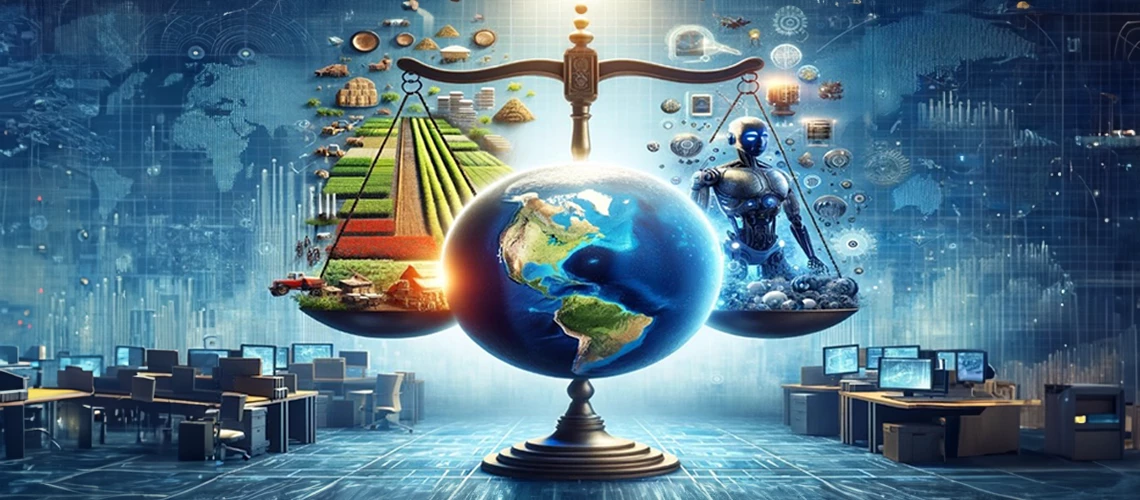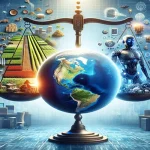Introduction
Artificial intelligence is no longer a distant concept — it has become the backbone of global commerce, influencing everything from financial forecasting to supply chain management. In boardrooms and startups alike, AI-driven insights now shape the future of markets and innovation.
Meanwhile, celebrities and entrepreneurs are entering the business and tech arenas, merging fame with data intelligence to create brands that redefine wealth, influence, and social responsibility in the modern economy.
AI and the Transformation of Global Business Models
AI has revolutionized how companies operate, offering predictive analytics that enable firms to anticipate market shifts, consumer behavior, and investment risks. Automation is now central to industries ranging from manufacturing to banking.
By harnessing machine learning and big data, businesses have gained unprecedented agility — allowing even small startups to compete with corporate giants on a global scale.
Celebrity Entrepreneurs and the Data Economy
Celebrities such as Kim Kardashian, Elon Musk, and Jay-Z have turned to AI-driven analytics to power their brands and investments. From personalized marketing to consumer data tracking, fame and algorithms have become an inseparable pair.
These celebrity-led ventures blur the line between entertainment and enterprise, showing how influence, when combined with AI, can evolve into powerful, data-fueled empires that transcend traditional industries.
AI in the Global Financial Market
The financial world has been quick to embrace AI as a strategic advantage. Predictive trading algorithms now assess millions of data points per second, identifying investment opportunities faster than human analysts ever could.
However, this speed has introduced new risks — including market volatility and ethical concerns over algorithmic decision-making — prompting global regulators to tighten oversight of AI-driven financial systems.
Sustainability and Ethical Capitalism in the AI Era
As corporations adopt AI for growth, many are turning to sustainability as a moral counterbalance to automation. AI tools are being used to track carbon emissions, optimize resource efficiency, and guide green investments.
This shift reflects a broader trend in business ethics, where profit and purpose coexist — driven in part by celebrity voices and public demand for responsible capitalism.
The Global AI Race and Economic Inequality
The race for AI dominance has become a defining feature of international politics. The United States, China, and the European Union are investing heavily in AI infrastructure to secure economic and geopolitical leadership.
Yet, as automation accelerates, fears of job displacement and inequality persist. Experts argue that global economic stability will depend on how nations integrate human workers into AI-powered industries rather than replacing them entirely.
The Future of Innovation and Human Collaboration
The next wave of AI development emphasizes collaboration — humans working alongside intelligent machines to enhance creativity, strategy, and empathy. This partnership marks a new phase of innovation where intuition meets computation.
Celebrity entrepreneurs and business leaders alike are beginning to understand that the real power of AI lies not in replacing people but in amplifying human potential on a global scale.
FAQs
How is AI changing global business?
AI automates complex tasks, predicts trends, and enhances decision-making, allowing companies to operate more efficiently across borders.
Which celebrities are leading in AI entrepreneurship?
Figures like Elon Musk, Kim Kardashian, and Will.i.am are investing in AI-driven ventures across technology, fashion, and entertainment.
Can AI make the global economy more sustainable?
Yes, AI can optimize supply chains, monitor emissions, and guide investment toward environmentally responsible growth.
What are the risks of AI in finance?
Algorithmic bias, lack of transparency, and market manipulation are key risks regulators are working to mitigate.
How can AI reduce global inequality?
When used ethically, AI can expand access to education, improve job creation, and promote inclusive economic development worldwide.
Conclusion
The union of AI, global economics, and celebrity entrepreneurship marks the beginning of a new financial era — one where innovation, influence, and intelligence intertwine to redefine power.
As the world embraces this digital transformation, the challenge will be ensuring that technology-driven wealth also promotes fairness, sustainability, and humanity’s collective progress.





